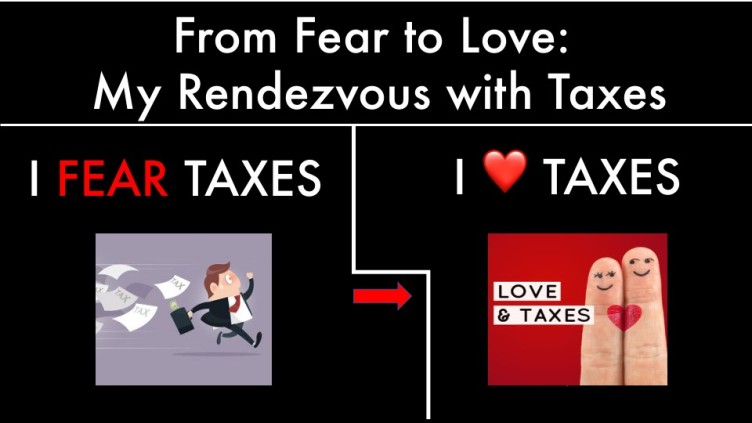Doing taxes for most of us is something more like a scary monster that we have to battle once a year rather than an enjoyed pastime. Sure, there is the benefit of potentially getting a big return as a payout, but it’s really our own money we’re getting back so should we really be that happy with that? My curiosity led me down a journey which helped me evolve my outlook on taxes from being something I feared terribly to something I can honestly say I’m now infatuated with and love is on the horizon.
I must start with being very transparent and clearly call out the fact that I should have no business writing an article on the subject of taxes. I’m not a CPA, I didn’t study accounting, and I’ve made more costly mistakes with taxes than triumphant write off victories. Up until my recent adventures which I’ll describe here shortly, I completely and utterly hated taxes. It was my excuse on why I didn’t take certain investment opportunities on, it was a roadblock for my ability to get to the next level of investing and at the end of the day, it was something I flat out loathed. That was until I decided I wasn’t going to let the fear of something that everyone has to deal with on an annual basis be something I fear. I wanted to tackle it head on to see what is possible if I just tried to dive into the world of taxes for a podcast sprint and the result is me feeling more confident than ever in the financial decisions I need to make moving forward. I may not be anywhere near an expert on this topic and probably never will, but tip 1 as described below is the main reason I feel this way. I’ve hired intelligent people to help me with this very complex subject and their willingness to engage, teach me, and help me look out for my best interest is going to be the key for me to grow from where I am now, to an all-out investment tycoon mogul that I’m aspiring to be (One can dream!).
Here’s the story of my journey with taxes.
Not unlike many millennials in my position, I started my journey with an unknown topic with a Google, Youtube, and a Reddit internet search. What I quickly realized was that this topic was not your average sit down and watch a 10 minute life hack video to learn type of topic. I had as much experience in this topic as your average commoner who speaks to their tax person once/twice a year and I could see that wasn’t enough. That was actually a big upgrade from me doing my own taxes in TurboTax just 3 years ago. The fact that they asked all these super serious questions and there was no one around to check my work spooked me a bit and was what first sparked the idea of getting help.
Fast forward back to 1 month ago, I found myself having some luck in the cryptocurrency market, the stock market, and recent investments were starting to be completed and payout was expected sometime later this year. I decided it was time to get help so after my initial self-research, I decided it might be wise to reach out to my peers and social media to enlist help. I wrote a brief description of my situation and the complex portfolio I was working with and posted in multiple social media outlets.
There was one post I did on a Facebook group titled “Asian Hustle Network (AHN)”that caught traction and people started commenting saying they were either looking for similar help or recommended someone. It ended up leading to ~100 comments, ~25 recommendations, and I set up 11 meetings with CPAs over the course of 14 days. The first thing I learned was that it is not the best idea to ask for tax help in the peak of tax season, but those who I did meet with were extremely helpful. I had 3 CPAs learn about my portfolio and immediately say they couldn’t help with such a complex project which was completely understandable. But those who were able to balance their current clients and still make room to meet with me were exactly the type of people I was hoping to partner with. That when the going gets tough, the tough get going.
Below are the top 5 tips I’ve summarized based off my rendezvous with taxes. I hope you are able to take something valuable away from it and please share it with others if you found it helpful!
Tip #1 – Better to pay an attorney/CPA vs. the government
Many of us are constantly looking for ways to save money. It’s natural to want to find a discount or get a good deal, but what people don’t realize is that the best deals can actually cost more up front. I can’t stress this one enough and even if you just get to step 1, you’ll be doing a whole lot better than if you’re not doing this at all. Intelligent people hire intelligent people so open up your wallet and find the best talent you can. Everyone has to do their taxes so there’s probably plenty of recommendations but vet out potential tax partners and consider asking for services beyond the standard tax preparation. There are now CFO on demand services, CFO subscription services, and a ton of partnerships out there that can meet your needs. I ended up selecting Anna Choung (IG: @tsavvymama) and Eric Ngheim (https://thecashflowdoctor.com/) as my partners in crime for my tax journey ahead! So stoked to have found such talented individuals!
Tip # 2 – Make taxes your bi…zness!
The first rule of the tax club is to talk about taxes! Don’t just think about it once a year when it’s time to file. Ask others that may be involved in similar type of projects how they approach doing their taxes. Ask a friend, do your research and try to patriciate in educational opportunities regarding taxes at least once a month. This can be watching a Youtube video, reading an article or joining a Clubhouse discussion. I frequent a Tax Talks Clubhouse chat that takes place weekly at 7pm pst. It allows me to ask open questions I may have without having to schedule a meeting with my CPA or it can be an arena to confirm your research with actual tax professionals and experts.
Tip #3 – Why long term holds pay off
The government typically makes it more favorable for investors to hold onto investments for the longer term and provide tax benefits if done so. The rates can vary depending on the type of investment and your income bracket but an example would be capital gains tax for stocks you own and sell. If it is done before one year of purchase date, you can be taxed up to 37%. After holding a stock for 12 months or longer, it can be reduced to 15%/10%/5% so it’s definitely advantageous to hold onto investments longer when the situation allows for it.
4 Examples of Ways to Reduce Capital Gains Tax on a Investment Property
1. Purchase Properties Utilizing Your Retirement Account
2. Convert The Investment Property into a Primary Residence
3. Leverage Tax Harvesting. (selling of securities at a loss to offset a capital gains tax liability). This strategy is typically employed to limit the recognition of short-term capital gains.
4. Considering using a 1031 Tax Deferred Exchange. – you can avoid capital gains if you trade up for bigger investments – stipulations apply so it’s not always available but can be a valuable option if it is.
Tip #4 – Corporations are the biggest secret of the rich
This is one of the key lessons in Robert Kiyosaki’s “Rich Dad Poor Dad” book. There are a ton of resources available on this topic online but a few key reasons people deploy an LLC for their investments are the following.
- Liability – Reduce the liability so that the investment is separated from other investments and your personal assets.
- Partnerships – Help structures partnerships and relationships with multiple parties. An LLC can clearly identify participating members, their roles, and % of ownership in the company
- Co-location of Owners – For partners that live in different regional areas, an LLC can help provide a vehicle for legal documents to be processed more streamlined through a corporation. It eases the burden of partners so not all parties are needed for each action and responsibilities are clearly defined.
- Business Expenses – The ability to write off expenses that you incur when operating, managing or working on business related matters
Tip#5 – Separation of business and personal
If you do have your own business, then it is key to ensure you keep charges and financial statements separately to the best of your ability. Have a tracker for specific business related expenses and keep track of receipts, meeting details, and summaries of the business activity that was taking place during any expensed event. There are a ton of ways to benefits from creating a corporation, but make sure it is all separated when it comes to business vs personal expenses.
This list could have easily ballooned into top 100 tips so I really do hope that this is just the tip of the iceberg of your education on tax strategy. Stay curious on this topic and please share your learnings with myself and others around you. Who knows, you might just be able to introduce a new love into someone else’s life by sharing your own story of how love conquers all. Your taxes are no exception!
Check out more details on our latest podcast episode, #009 – Investing 1 D – Taxes and Finances @ a-ztalks.com
A few helpful links that might help you on your journey:
Episode link: – https://anchor.fm/az-talks/episodes/09—Investing-1D—Financing-and-Taxes-et50uj
My new CPA: https://www.linkedin.com/in/annachoung/
My new Tazhttps://thecashflowdoctor.com/






